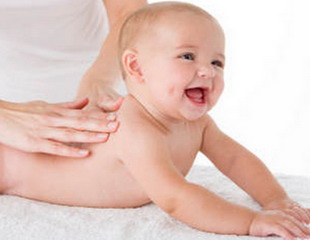Women Healthy -

Babies often have hiccups after drinking milk or eating. Hiccup is sometimes disturb the baby but as long as baby is still happy, smiling, can eat, and drink well there is nothing to worry about. No need to panic if your baby's hiccups. Although it is one of the most common in infants under one year of age, hiccups are not indicative of a serious illness.

Hiccups are a reflex movements of the body and is accompanied by a distinctive sound due to irritation of the diaphragm. The diaphragm plays a major role in the course of respiration and metabolic processes. Diaphragm pulling and pushing on a regular basis that regulates entry and exit of air during the process of respiration. The structure will be disturbed muscle function if there is anything that inhibits the process, either from internal or external factors.
Hiccups are an unpleasant condition and can affect people of all ages, including newborns. Hiccups are a normal and natural for babies, unless hiccup to disrupt their activities such as sleeping or eating. Babies who have gastroesophageal reflux disease may be more likely to experience hiccups.
If hiccups often causes babies to be vomiting, coughing, very fussy or very uncontrollable until the baby is older than a year, then the parents should consult it to the doctor.
Causes of Hiccups In Baby
Baby hiccups or in adults, can be caused by the blood carbon dioxide levels dropped sharply and becomes lower than it should be. Hiccups can also be triggered by some of the following:
- Because eating spicy food or due to excessive drinking and eating with quantities. And the hiccup was a spontaneous reaction of the condition of the body that they do not choke while drinking or eating.
- Irritation to the phrenic nerve, this is the type of motor nerve to the diaphragm that serves to assist in the control of breathing.
- Emotions or because of stress, this could also be the cause of hiccups in a person.
- Other causes, there is a foreign object in the ear.
- In a person who is undergoing chemotherapy, could affect the occurrence of continuous hiccups.
Tips To Get Rid Of Hiccups In Baby:
Here are some alternatives to overcome hiccups in babies:
1. Changing the position.
Sometimes, babies swallow air during feeding too much, this is what causes hiccups in babies. So, change the feeding position to limit the amount of air that goes into the baby's mouth.
2. Burping.
It is important for the baby to burp after feeding. Burp done to remove excess air or gas in the baby's stomach. In some cases, burping can also help release muscle spasms in the diaphragm and can finally stop hiccups in babies.
3. Back massage.
Baby hiccups are not harmful to health. All you need do is to calm the baby. Rub your baby's back while soothing so hiccups are gradually disappearing.
4. Eat on a regular basis
You have to feed in babies before it is too hungry and the stomach contains a lot of gas. Hiccups can be a sign of stomach problems. If the hiccups indicate gastric problems, then they will be accompanied by vomiting.
5. Stop eating when hiccups do not stop
After a few minutes, if the hiccups do not stop, you need to stop breast-feeding a baby. If you continue to feed the baby while she hiccups, the baby may vomit. This will make the baby more upset. So the only solution is to let the baby hiccups disappeared, and then resume eating again.









